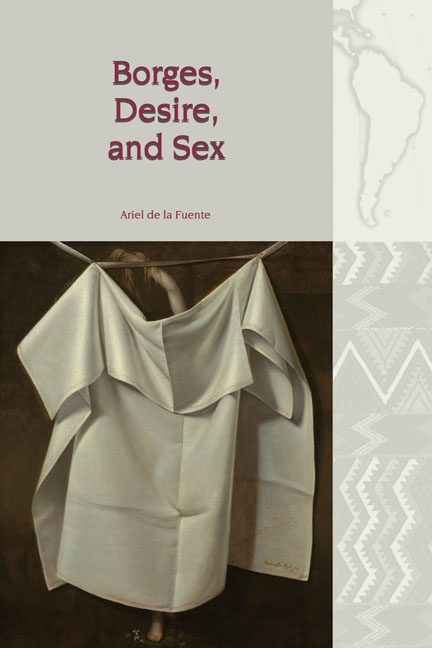Book contents
- Frontmatter
- Dedication
- Contents
- Acknowledgements
- List of Abbreviations
- Introduction
- 1 On Borges’s Sexuality
- 2 Biography in Literature and the Reading of Desire and Sex in Borges
- 3 Borges’s Erotic Library: The Poetry Shelf
- 4 Sir Richard Burton’s Orientalist Erotica: The Thousand Nights and a Night and The Perfumed Garden
- 5 Schopenhauer and Montaigne, Philosophy and Sex
- 6 Desire and Sex in Buenos Aires: Borges’s Poetry on the Arrabal
- 7 Stoicism and Borges’s Writing of Women
- 8 “Emma Zunz”: Sex, Virtue, and Punishment
- 9 “La intrusa”: Incest and Gay Readings
- Conclusions
- Works Cited
- Index
3 - Borges’s Erotic Library: The Poetry Shelf
- Frontmatter
- Dedication
- Contents
- Acknowledgements
- List of Abbreviations
- Introduction
- 1 On Borges’s Sexuality
- 2 Biography in Literature and the Reading of Desire and Sex in Borges
- 3 Borges’s Erotic Library: The Poetry Shelf
- 4 Sir Richard Burton’s Orientalist Erotica: The Thousand Nights and a Night and The Perfumed Garden
- 5 Schopenhauer and Montaigne, Philosophy and Sex
- 6 Desire and Sex in Buenos Aires: Borges’s Poetry on the Arrabal
- 7 Stoicism and Borges’s Writing of Women
- 8 “Emma Zunz”: Sex, Virtue, and Punishment
- 9 “La intrusa”: Incest and Gay Readings
- Conclusions
- Works Cited
- Index
Summary
In “El otro,” an older Borges recalls the texts he held in his bookcase in Geneva, including one “escondido detrás de los demás, un libro en rústica sobre las costumbres sexuales de los pueblos balkánicos”; and immediately afterward, he alluded to his traumatic sexual initiation: “No he olvidado tampoco un atardecer en un primer piso de la plaza Dubourg,” which hinted at a meaningful relationship between his readings and his sexuality. Psychoanalyst Kohan Miller said that one of the ways Borges tried to cope with his overwhelming sexual troubles was, of course, reading: “Borges se detenía en todas las vidrieras de las librerías para ver si había un libro sobre sexualidad. Era un tema sobre el que quería leer, lo quería dominar, quería saber.” Dr Kohan Miller had also discovered Borges's erotic sensibility in his responses to literature and women: “a pesar de su problema, sentía placer orgástico [sic] al escuchar ciertas voces femeninas al teléfono, o cuando leía ciertas frases o versos que indudablemente lo excitaban. Su sensibilidad resonaba a nivel genital.” That is, Borges could be aroused by literature, and the reading of poetry could become an erotic interlude. A woman who experienced that sensibility was Estela Canto. She remembered that in one of their romantic encounters, Borges “se excitaba con las crípticas palabras de un poema leído y releído en la adolescencia” and, against the generalized (and wrong) idea of Borges's “frialdad sexual,” she underscored that “la literatura siempre tuvo temperatura para él.”
So, Borges could be sexually stimulated by literature. Therefore, in a man who often defined himself more as a reader than as an author and who said “Pocas cosas me han ocurrido y muchas he leído,” the exploration of the pages that he read (and reread) is a fundamental step in locating desire and sex in his own life and texts.
Among texts that explore desire and sex, there is a continuum that begins with literature on “love,” passes through “erotica,” and ends in “pornography.” The borders among categories are usually blurry and slippery, and it is not always easy to decide with certainty where a text fits.
- Type
- Chapter
- Information
- Borges, Desire, and Sex , pp. 48 - 83Publisher: Liverpool University PressPrint publication year: 2018

